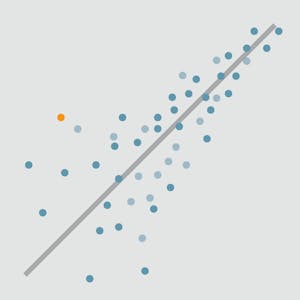Linear Regression and Modeling is a comprehensive course offered by Duke University, delving into the fundamental theory and practical application of simple and multiple linear regression models. Through real-world examples and data, learners will gain the expertise to fit, examine, and utilize regression models to explore relationships between multiple variables. The course provides a deep understanding of statistical concepts and their practical implementation using the free statistical software R and RStudio.
Key topics covered in the course include introduction to statistics with R, correlation, residuals, least squares line, prediction and extrapolation, conditions for linear regression, R squared, regression with categorical explanatory variables, outliers in regression, variability partitioning, inference for linear regression, multiple predictors, adjusted R squared, collinearity and parsimony, inference for multiple linear regression, model selection, and diagnostics for multiple linear regression. Throughout the course, learners will engage in quizzes, practice exercises, lab instructions, and project work to reinforce their understanding and application of the material.
By the end of the course, participants will have the skills and knowledge to effectively assess and predict relationships between variables, making informed decisions based on data analysis and interpretation.
Certificate Available ✔
Get Started / More Info
This course comprises four modules that cover the fundamental theory and practical application of linear regression models. Participants will explore topics such as correlation, residuals, multiple predictors, and model selection, gaining comprehensive skills in statistical analysis and interpretation.
This module introduces the fundamental concepts of linear regression and modeling, providing an overview of the Statistics with R specialization. Learners will gain insights into the theoretical foundations of linear regression and its practical application using statistical software. The module includes an in-depth exploration of linear regression and modeling, setting the stage for the subsequent modules.
In this module, participants will delve into the intricacies of linear regression, covering critical topics such as correlation, residuals, least squares line, prediction and extrapolation, conditions for linear regression, R squared, and regression with categorical explanatory variables. The module also includes suggested readings, practice quizzes, and a comprehensive quiz to reinforce learning.
Module 3 focuses on advancing the understanding of linear regression, addressing topics such as outliers in regression, inference for linear regression, variability partitioning, and lab instructions using RStudio. Learners will engage in suggested readings, exercises, lab choices, and quizzes, gaining practical experience in applying advanced concepts.
This module delves into multiple regression, exploring complex topics such as multiple predictors, adjusted R squared, collinearity and parsimony, inference for multiple linear regression, model selection, and diagnostics for multiple linear regression. Participants will also receive project instructions, data files, and a checklist to apply their knowledge in a comprehensive project. The module includes lab instructions, quizzes, and a practice quiz for thorough understanding.
Data Science and Analysis Tools - from Jupyter to R Markdown is a comprehensive specialization introducing Python and R for data analysis, visualization, and communication....
Learn to create your first Power BI Dashboard in this guided project, covering interactive report design, theme customization, live data publishing, and mobile view...
Learn the fundamentals of MYSQL Workbench in this 1-hour guided project, covering database creation, modeling, and manipulation.
Learn to build a Support Vector Machine for classification using scikit-learn and the Radial Basis Function (RBF) Kernel.